Sahiyo’s U.S. Communications Manager is awarded a Masters degree with merit
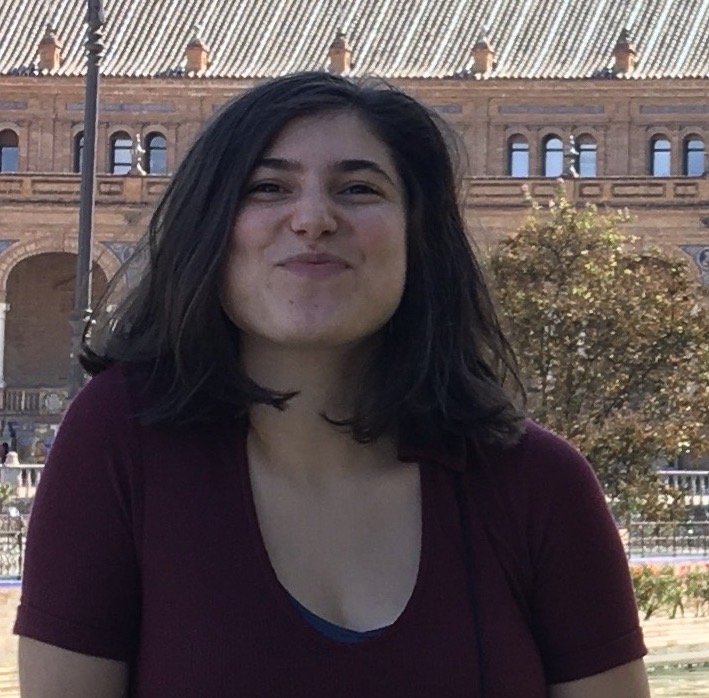
Lara Kingstone, Sahiyo’s U.S. Communications Manager, was awarded a Masters of Science in Social Development Practice with merit from University College, London. Her dissertation is entitled, “The Cultural Battlefield of Localized Comprehensive Sex Education: A Comparative Study From North East Africa to India.” This dissertation sought to contextualize the dynamics around Comprehensive Sex Education (CSE) to draw conclusions about how this globalized philosophy of teaching gets localized. Lara examined the concepts of universality versus relativity, and applied this tension to global sex education efforts. She problematized the dynamic of Western hegemony in the rights-based approaches to sex education whilst recognizing the need for education that protects youth, regardless of cultural setting. Her thesis faced the uncanny contradiction we must grapple with — that CSE has been deemed a universal right, but many cultures are opposed to CSE perspectives on homosexuality, female genital cutting, gender roles and more. Furthermore, progressive local CSE advocates are often questioned about their legitimacy and authentic claim to ‘localness.’ Lara dug into these questions in several case studies including Sahiyo and a small program in Addis Ketema, Ethiopia. Lara started her career in a youth-focused program designed to integrate London communities and empower young people to become active and engaged citizens. She earned a B.A. in Political Communications at IDC Herzliya, while working as a journalist at The Culture Trip and producing and hosting a human rights radio program. While studying, she worked at an educational center which aimed to help Palestinian and Israeli young people learn together. Since then, she has worked with human trafficking prevention and gender-based violence prevention on the Thai-Lao border, and has worked as a community outreach coordinator to connect youth in foster care with mentors in Boston. Lara hopes to use this degree to further her goals of working for gender equity, the LGBTQ+ community and international human rights.
Sahiyo staff spoke in a symposia entitled Mothers and daughters: continuity, love, fear and belonging

Sahiyo Communications Coordinator Lara Kingstone and co-founder Mariya Taher were honored to speak on behalf of Sahiyo in a symposia entitled, Patriarchal Inscriptions: Female Bodies Contested, Invaded, Defended & Owned, hosted by King’s College London Faculty of Arts and Humanities. [youtube url=”https://youtu.be/PZ3YZQxc7FM”]W The session that Sahiyo participated in served to address feminism, survivors’ relationships with mothers, other forms of gender-based violence and abuse, as well as systemic injustice. The symposia in general served to address the following questions: “Feminism has made the exploration of relations between mothers and daughters central to its project. How are these considered fraught, damaged, broken, or, in the eyes of FGM-supporters, strengthened by clitoridectomy? How does FGM compare to other abuses women endure that fracture their inclination to identify and support one another, instead of becoming invested in, or complicit with, systemic injustice?” Taher and Kingstone discussed and presented Sahiyo’s Voices to End FGM/C: Using Storytelling to Shift Social Norms & Enhance Prevention as part of the panel on Mothers and daughters: continuity, love, fear and belonging. Many storytellers and survivors explore fraught or strengthened relationships with their mothers in their digital videos as part of the Voices to End FGM/C program in collaboration with StoryCenter. By sharing these stories with participants, Sahiyo aimed to further understanding regarding the deeply complex mother-daughter relationship in the context of FGM/C. Read the full program.
Annual Reports
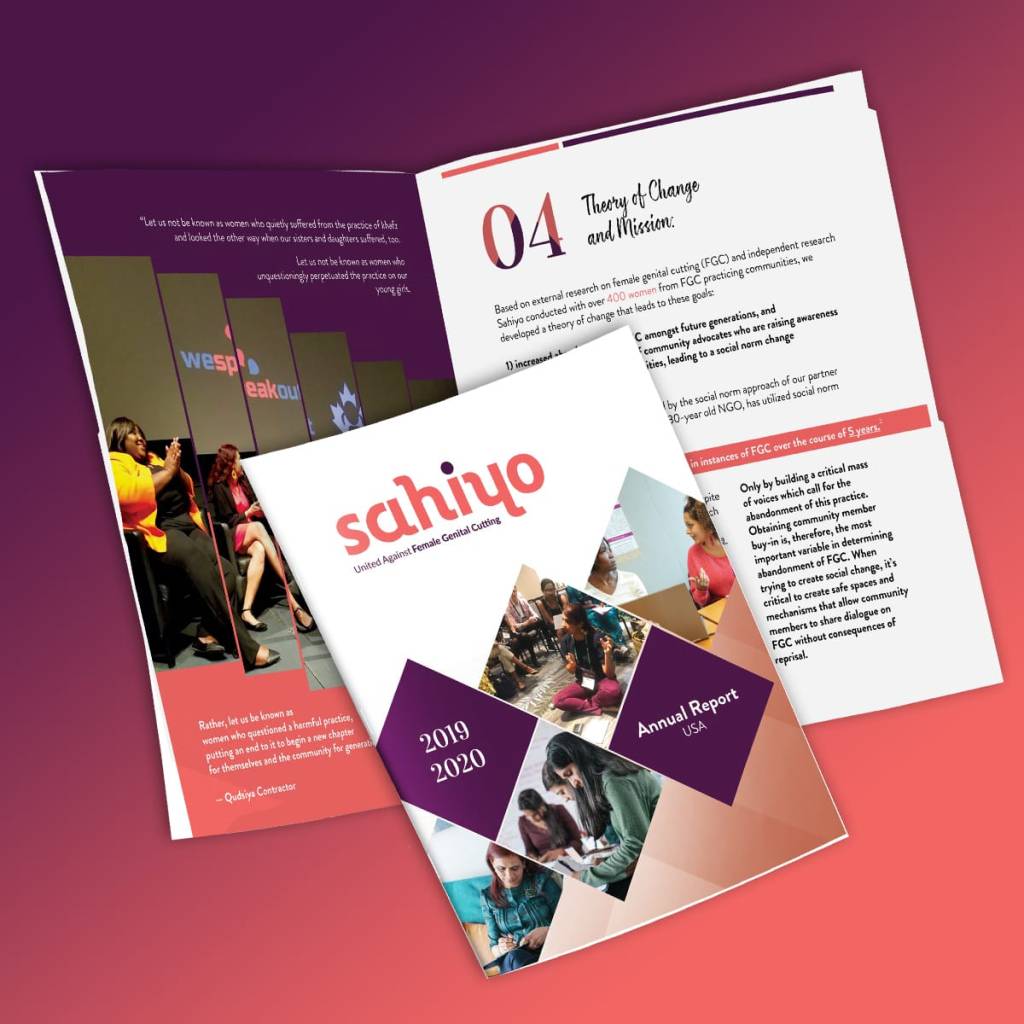
Annual Report: Sahiyo U.S: June 2019-June 2020 Throughout this past year, our programs have expanded to support larger numbers of women impacted by female genital cutting. Our Voices to End FGM/C project alone saw the creation of 37 new original digital stories stories. Running since 2017, the program involves survivors coming together to heal from their FGC experiences and create their advocacy videos. The program has received sizable number of participants from a diverse range of countries including the United States, India, Singapore and Zimbabwe.#MenToEndFGC, our Male Ally campaign is another one of our success stories from the past year. The campaign encouraged over 40 men across the globe – from Ghana and Kenya to multiple regions of India and the United States- to share stories via our various digital storytelling platforms about how FGC had impacted the women in their lives, including their wives, daughters, sisters, or female friends. Each participant made it clear that they were in ally in ensuring FGC ended for girls and women worldwide. All our work could not be completed without the wonderful support of our volunteers. And in this past year, we’ve grown our volunteer program by 70%, with 50 volunteers from over 9 countries. To learn more about our vital work this past year, please take some time to read the Annual Report. Thank you for being part of our journey.
Staff Spotlight: Development Intern Sarrah Hussain
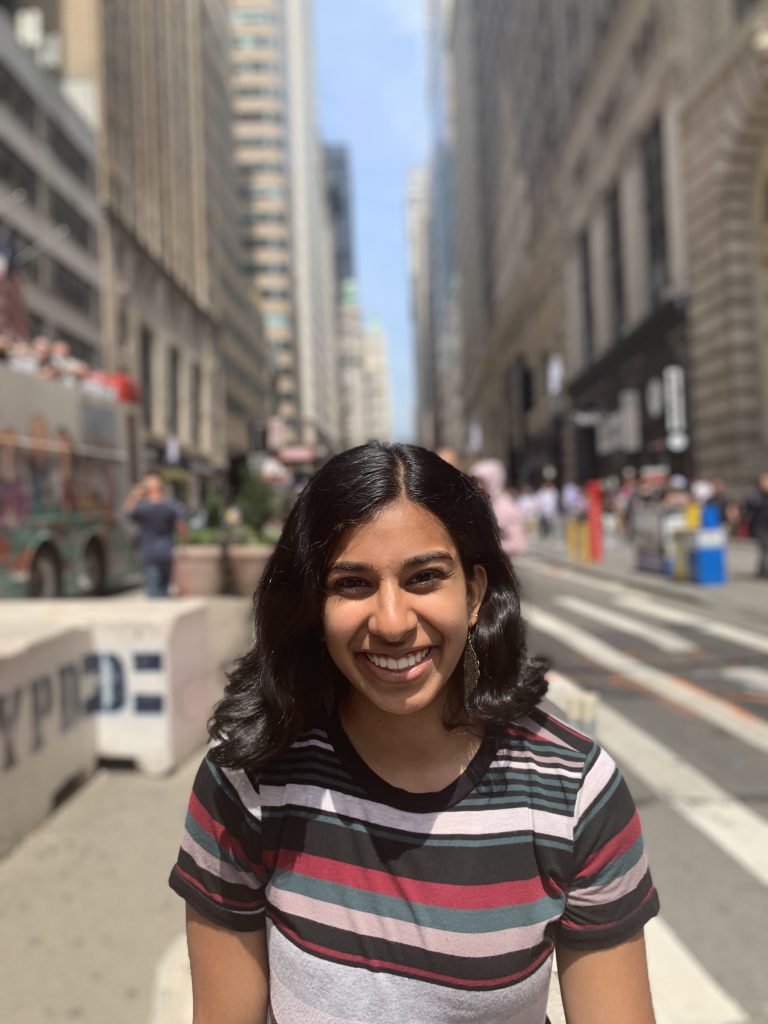
Sarrah is an undergraduate student still exploring what she wants to study at Stanford University. She is passionate about women’s rights and health, especially female genital cutting (FGC). This will be her first time working with a nonprofit organization, and she is excited to create change and uplift voices with the Sahiyo team. 1) When and how did you first get involved with Sahiyo? I began following the Sahiyo instagram account and learning about their mission last year, and when I saw the opening for internships in February I thought I’d shoot my shot. Since May of this year, I am officially a development intern for Sahiyo, and could not be more excited to work with this incredible team to make an impact for an issue I care deeply about. 2) What does your work with Sahiyo involve? As a development intern, my work is primarily focused on expanding Sahiyo and securing grants and funding opportunities so Sahiyo can do the meaningful work it does. 3) How has your involvement with Sahiyo impacted your life? I am still relatively new to Sahiyo, but already Sahiyo has impacted my life because I know I am contributing to a larger mission to create a greater change in the world. I am inspired by the passion I see in those I work with, and happy knowing my work has real meaning. 4) What words of wisdom would you like to share with others who may be interested in supporting Sahiyo and the movement against FGC? I would say take the leap! When first considering applying to Sahiyo, I didn’t think I had the skills necessary to be a development intern, I was scared that I wouldn’t live up to what was asked of me, and I was even a little nervous about being involved with a nonprofit working on such a taboo subject. But I took a leap, applied, and got the position, and I am so happy I did. Though sometimes I feel lost, there is a whole team of wonderful people who want to support you and help you learn. It is really comforting and inspiring to see others who feel the same way as you and simply want to protect future generations of girls.
Sahiyo India needs a part-time Communications Associate

Sahiyo India is looking for a Communications Associate to support various programs, projects and public communications. In this role, you should be an excellent communicator with strong attention to detail. Creating social media campaigns, editing and writing Sahiyo materials and grant based writing will be an important part of your job. If you also have administrative and social media marketing experience, we’d like to meet you. This is a part-time position ideal for a young professional located anywhere in India. We are looking for someone proactive, who is willing to work independently and remotely, for up to 20 hours a month. This is a great opportunity for you to work with the founders of an internationally-recognised organisation, and learn how organisations develop from the ground up. Job duration: September 2020 – November 2020 (with the potential to extend further) Responsibilities & Duties: Facilitate internal and public communications Assist in developing programme/campaign plans and strategies and drive them. Draft and edit communications (e.g. reports, social media posts, press releases) Assist in maintaining web content and executing social media strategies for Sahiyo India Support the administrative manager with logistical coordination of Sahiyo programmes and events as needed. Support Sahiyo India Co-founders in creating and executing campaigns Requirements: Understanding of media relations and digital media/campaign strategies Proficiency in Google Docs, MS Office; familiarity with design software (e.g. Canva, Photoshop, InDesign) and content management systems is a bonus, Experience with Excel and data manipulation is a bonus Solid editing and researching skills Excellent communication abilities (oral and written) Ability to multitask on different projects Strong attention to detail Organizational skills Desired Qualities: Experience working in the field of gender-based violence, FGM/C, or related field. Sensitivity towards different cultures To Apply: Please send a resume and cover letter to Priya Goswami at priya@sahiyo.com no later than Tuesday, August 28, 2020. The email subject line should state “Application: Communications Associate”. About Sahiyo SAHIYO, an award winning, transnational, organization is dedicated to empowering Asian communities to end female genital cutting (FGC) and create positive social change through dialogue, education and collaboration based on community involvement. By working towards an FGC-free world, we aim to recognize and emphasize the values of consent and a child’s/woman’s right over her own body. We aim to enable a culture in which female sexuality is not feared or suppressed but embraced as normal. For more read, about Sahiyo’s storytelling and our history.
Crave Foundation recognizes Sahiyo co-founder Mariya Taher as 2020 grantee
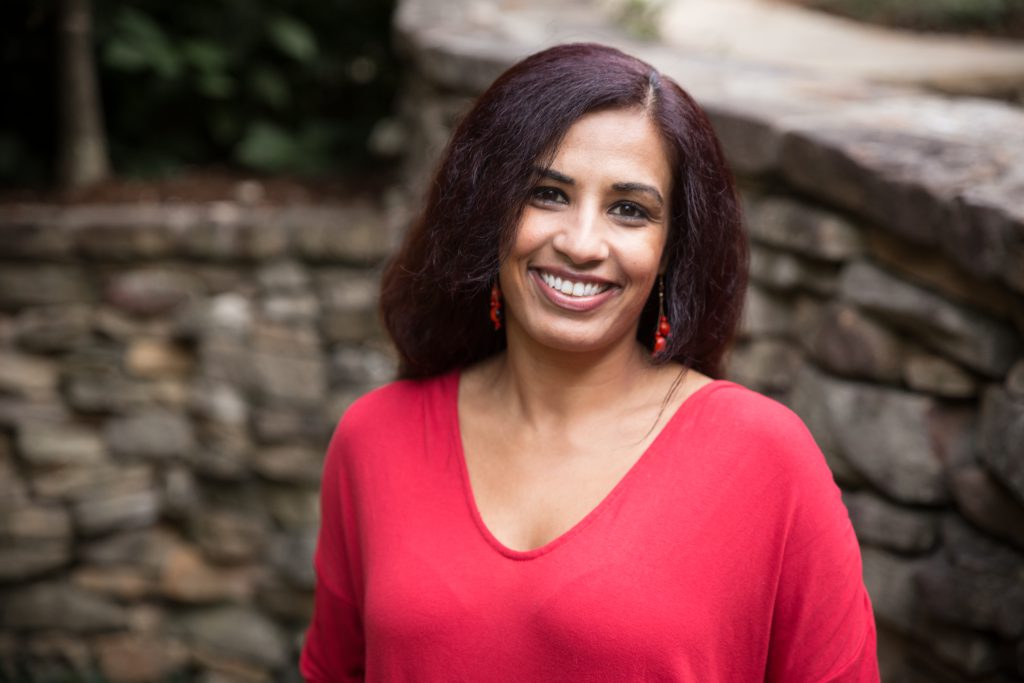
by Jenny Cordle The Crave Foundation for Women selected Sahiyo co-founder Mariya Taher as one of their inaugural recipients for an individual grant in recognition for her work to end female genital cutting (FGC) in Asian communities and beyond. In 2015, she co-founded Sahiyo – United Against Female Genital Cutting, an award-winning, transnational organization with the mission to empower Asian communities to end FGC. She is one of five 2020 grantees. The Crave Foundation acknowledges that “pleasure is a universal human right that can not be fully realized where there is injustice and violence against women.” The foundation recognizes individuals who are working in the gender-based violence areas of female genital cutting and sex trafficking. Their model is unique in that they provide no-strings-attached grants so that grantees can utilize the grants in the most appropriate way they see fit. “That is incredibly rare, and I’m brimming with ideas now on how to use these funds to further my work to both support survivors and prevent future generations of girls from undergoing FGC,” Taher said, who is a survivor of FGC. Taher’s work at Sahiyo focuses on storytelling programs and creating a critical mass of voices against FGC to “create a culture in which survivors can heal by connecting” to work toward creating a society where FGC no longer occurs. “I’m constantly learning and adapting my work and Sahiyo programs to fit the needs of both survivors and the communities they belong to in which FGC occurs,” Taher said. “For myself, from the very beginning, I started engaging in anti-gender-based violence work because I had both lived experiences with gender-based violence, and also knew so many other individuals who also had experiences of some form of gender-based violence, whether it was female genital cutting, domestic violence, or sexual assault. I understood how both culture, society, and even one’s family could play a part in perpetuating environments in which violence occurred, and I wanted to learn how to undo that violence.” In addition to her work at Sahiyo, Taher collaborates with the Massachusetts Women’s Bar Association on passing state legislation to criminalize FGC; an endeavor in which FGC activists and lawmakers had two victories when the Massachusetts House of Representatives and the Senate recently passed bill H.4606 – An Act Relative to the Penalties for the Crime of Female Genital Mutilation. The bill is now on Governor Charlie Baker’s desk to be signed into law. Taher also creates community education and outreach programs within the state on this issue. Taher serves on the steering committee for the U.S. End FGM/C Network. In 2018, Taher received the Human Rights Storytellers Award from the Muslim American Leadership Alliance. The Manhattan Young Democrats honored her as a 2017 Engendering Progress honoree, and ABC News did a special feature on her, entitled: Underground: American Woman Who Underwent Female Genital Mutilation Comes Forward to Help Others. Taher has worked in the gender-based violence field for over a decade in the areas of teaching, research, policy, program development, and direct service. She has worked at Saheli, Support and Friendship for South Asian Women & Families, W.O.M.A.N., Inc., Asian Women’s Shelter, San Francisco Department on the Status of Women, San Francisco State University, and was a 2014 Women’s Policy Institute Fellow through the Women’s Foundation of California. During her journey as an advocate, she has learned that change takes time. “We all want change to happen quickly – particularly on issues in which violence is connected to children – but being an advocate teaches you that change is slow,” Taher said. “It doesn’t mean you won’t feel frustrated, and that there won’t be days when you want to just give up. Change will come. Every time I hear a survivor share her story out loud or learn someone has forgone having the practice done on their daughter – even each time that I learn an individual is joining this line of work because they want to make a difference, shows me that change is occurring and people care. All those examples give me hope, and it’s why I keep at this work.” Sahiyo co-founders include Aarefa Johari, Priya Goswami, and Insia Dariwala.
Volunteer Spotlight: Programs Intern Hunter Kessous
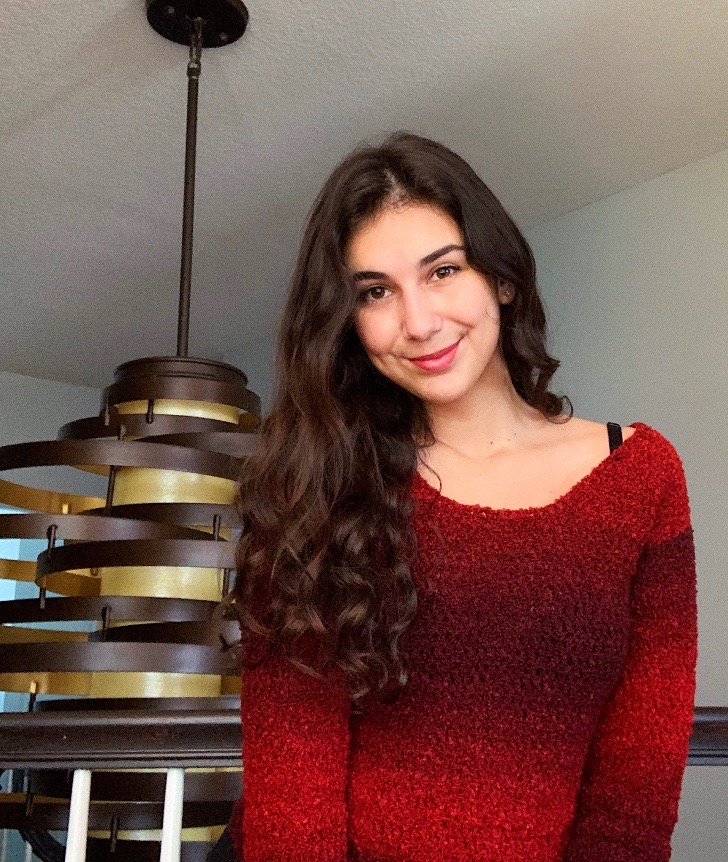
Hunter Kessous is currently an undergraduate at Brandeis University studying Biology, Health: Science Society and Policy, and French. She has been passionate about ending female genital cutting (FGC) ever since she first learned of the practice. Hunter aspires to be a gynecologist and perform reconstructive surgeries for survivors of FGC. Hunter is also a student researcher on an FGC project. She joined Sahiyo in May. When and how did you first get involved with Sahiyo? I first connected with Sahiyo when I reached out for help with my research project on the movement to abandon FGC. Mariya, one of the co-founders, asked if I would like to volunteer for the summer. When the pandemic started, I was worried I wouldn’t be able to get involved. I’m so grateful I’ve been able to work on the Sahiyo team remotely. What does your work with Sahiyo involve? I’m a programs intern, which means I am planning webinars. My big project at the moment is a webinar on FGC and education. The topic was inspired by my own experiences with how FGC is taught at my university. I also attend as many webinars as possible in order to learn what information is currently out there, and to see how other webinars are formatted. How has your involvement with Sahiyo impacted your life? Before my internship with Sahiyo, I read and learned a lot about FGC. Even still, in just the first month of volunteering, I have learned so much more than I anticipated. I’m eager to continue broadening my knowledge and understanding of FGC through my work with Sahiyo. I’ve also had the pleasure of meeting many wonderful anti-FGC advocates and survivors. The movement to abandon FGC consists of a close network, and I am thrilled to join the community and have the opportunity to work with so many inspiring people. What words of wisdom would you like to share with others who may be interested in supporting Sahiyo and the movement against FGC? For every moment you spend working with Sahiyo, you will feel that you are doing something important and worthwhile. You will meet empowering, wonderful people from inside and outside of the Sahiyo team that will make you feel supported and essential to the cause. I encourage anybody interested in joining the Sahiyo team to do so!
Farzana Esmail hosts fireside chat on FGC with co-founder of Sahiyo

By Hunter Kessous Mariya Taher, U.S. Executive Director and co-founder of Sahiyo, and Farzana Esmail, survivor, mother and advocate, sat down together to have a virtual fireside chat on female genital cutting: part interview, part sincere exchange of stories, and part education. Upon introducing Mariya’s background, Farzana asks her to call on her expertise to explain female genital cutting (FGC) to the audience, using World Health Organization classifications and statistics regarding global practice. Throughout the chat, Mariya provides essential background on FGC, making this a great video to watch for people of varying knowledge levels on FGC. Farzana described her experience of discovering through Sahiyo’s Voices to End FGM/C that FGC is practiced not only in the Bohra community, but in Africa as well. Mariya explained that this misconception exists only because Africa is where the bulk of the research on FGC was occurring until recently. FGC has been recorded as being practiced in at least 92 countries. Sahiyo conducted research on the Bohra community and discovered 80% of women from their sample had been cut. Another finding of that same study was that 81% of women did not want FGC to continue for the next generation. Farzana asked the important question of why FGC continues to be practiced if so many women feel this way. Mariya used the concept of pluralistic ignorance to explain: the tradition lives on because nobody in the community talks about FGC and therefore, nobody knows that other women are also suffering and do not want to cut their daughters. Sahiyo’s social change platform was born to amplify the stories and voices of survivors. Mariya references a study finding that in order to achieve social change, 25% of a community is needed to reach a certain tipping point, which is slowly happening within the Bohra community. Mariya also discussed the shift from the Millenium Development Goals (MDGs) to the Sustainable Development Goals (SDGs) – an important global health policy. The MDGs were a UN framework created in 2000 that enlisted all countries who signed on to put an end to various issues globally and to measure their achievement towards these goals. The MDG goal to abandon FGC only applied to 29 or 30 relevant countries, which were mostly within Africa and the Middle East. The issue here is that FGC is a global issue. It is prevalent in South Asia and is practiced in at least 92 countries. The SDGs, which followed the MDGs, finally recognized that FGC is a global practice. The fifth SDG specifically calls on countries to decrease FGC globally and measure the prevalence rates within their communities. In a similar vein to the importance of recognizing FGC as a global practice, Mariya shares the importance of involving men in the movement to end FGC. Sahiyo amplifies not only the voices of survivors, but also of fathers, brothers, and husbands of survivors. The goal is to show that FGC negatively impacts entire communities, not only the women who undergo FGC. This is an important action toward abandoning FGC. Revealing FGC to be more than just a women’s issue or a cultural issue means every single person has the right and responsibility to get involved in the movement to end FGC. Many are talking about the very important issue of an increase in gender-based violence as a result of the pandemic and the lockdown. Mariya has not noticed an increase in FGC within Asian communities or within the U.S., but instead notes the distress that the lockdown causes many FGC survivors. The isolation makes it harder to seek help, and the sense of a loss of control can trigger a trauma response for survivors. It’s important to draw attention to this issue in order to provide survivors with the services they need. View this eye opening discussion here.
Let’s Talk FGC: A fireside chat with Mariya Taher and Farzana Esmail

Mariya Taher, U.S. Executive Director and co-founder of Sahiyo, and Farzana Esmail, FGC survivor, mother and advocate, sat down together for a virtual fireside chat on female genital cutting (FGC): part interview, part sincere exchange of stories, and part education. Farzana and Mariya intertwine pieces of their personal experience with the facts and information they provide on female genital cutting. This webinar explores FGC as a global practice, the many ways in which it is performed, how it impacts survivors, and related legislation. Mariya and Farzana share the progress toward abandoning FGC that has been made to date, the impact of COVID-19 on this progress, and Sahiyo’s theory for social change. Farzana: Mariya, thank you so much for doing this. Before I go on to introduce your illustrious background, if I could take just a few minutes to set the context of our conversation. This is a subject that is extremely personal because I have lived through this. I have long fostered the idea of bringing my story and sharing it in the hope that it triggers conversations, and, in time, banishes the fear and discomfort that surrounds it. We are discussing female genital cutting. Mariya, you have been named one of the six experts on female genital cutting by News Deeply. You have worked for over a decade in the anti-gender violence field, from research to policy, program development, and direct service. You have attained your masters in social work from San Francisco State University and went on to pursue a qualitative study titled, “Understanding Female Genital Cutting in the United States.” You have been diligently working on the issue of domestic violence within a number of organizations. In 2015, you founded Sahiyo, an internationally recognized, award-winning organization, to empower Asian communities to end female genital cutting. You sit on the inaugural Steering Committee to end female genital cutting with the U.S. End FGM/C Network. In Massachusetts, you work with The Women’s Bar Association to pass state legislation that would ban FGC and create education and outreach programs for survivors. The Manhattan Young Democrats named you 2017 Engendering Progress Honoree and ABC News did a special feature on you. You have been a prolific writer in fiction and nonfiction essays and short stories that have appeared on NPR, The Huffington Post, the Fair Observer, and a number of credible publications. Mariya, the first time that I spoke about FGC with a group of friends I experienced a sense of relief. It was almost cathartic, but I also sensed disbelief, despair, and huge discomfort. There are those who have perhaps never heard of this practice, then there are those who have heard but choose not to speak about it, and then there are those, like us, who have lived through this. So if we can begin today by you just defining for us what in fact is female genital cutting? [youtube url=”https://youtu.be/a8Iy_oXk8qw”] Mariya: Sure, well, thank you, Farzana, so much for inviting me to speak and for that wonderful introduction. And, this is an incredibly important topic for me as well, as you have spoken a bit about my background. It is also one because I grew up in it, and I underwent it myself when I was seven years old. I wanted to just give that context first before I explain what female genital cutting is because I think it is important to recognize that many girls who have undergone it actually don’t know what they have undergone or even realize that what they have undergone is female genital cutting, or another term that it’s referred to as is female genital mutilation, but for the purposes of our conversation I will tend to refer to it as female genital cutting or FGC. So, according to the World Health Organization, female genital cutting involves all procedures involving cutting or removal of part [or all] of the external female genitalia for nonmedical reasons. There are various forms of it. The World Health Organization has actually categorized it into 4 types, but each of these types are very broad in itself. So, type 1 is something that usually involves cutting or excision of the clitoral hood or part of the clitoris, but it is very broad and could also include removal of all of the clitoral hood and also part of the clitoris. Type 2, which is considered more severe, involves partial or total removal of the clitoris and labia minora, with or without excision of the labia majora – so it’s the inner and outer lips of the female genitalia. Type 3 is narrowing of the vaginal orifice by creation of a covering seal, so it is generally the most severe form. It is also known as infibulation, and it can involve removing all of the labia minora and labia majora as well. Then there is type four which is considered the “other” category, and this is really something that involves anything that doesn’t fit in types 1 through 3 which can be pricking, piercing, cauterizing. Those are the 4 broad categories defined by the World Health Organization. Just to give you a little more information of the statistics that we have on female genital cutting, about 90% of women and girls who undergo it undergo types 1 and 2. So, type 3 which is the most severe form only really accounts for about 10% globally, and I think that is really important to recognize, too. Farzana: Sure, Mariya, you know when I started to follow Sahiyo, I also got acquainted with a lot of survivor stories, and some of these stories resonated, and I could identify completely. For most of us, the impression that I gathered was that it happens between the ages of 7 and 9. It’s almost something that is led on by either your grandmother, or an aunt, or your mother. The backdrop is a dilapidated dimly lit building where an elderly aunt answers the door and performs the practice. Immediately after that, there is a
Sahiyo co-founder gives keynote address at festival
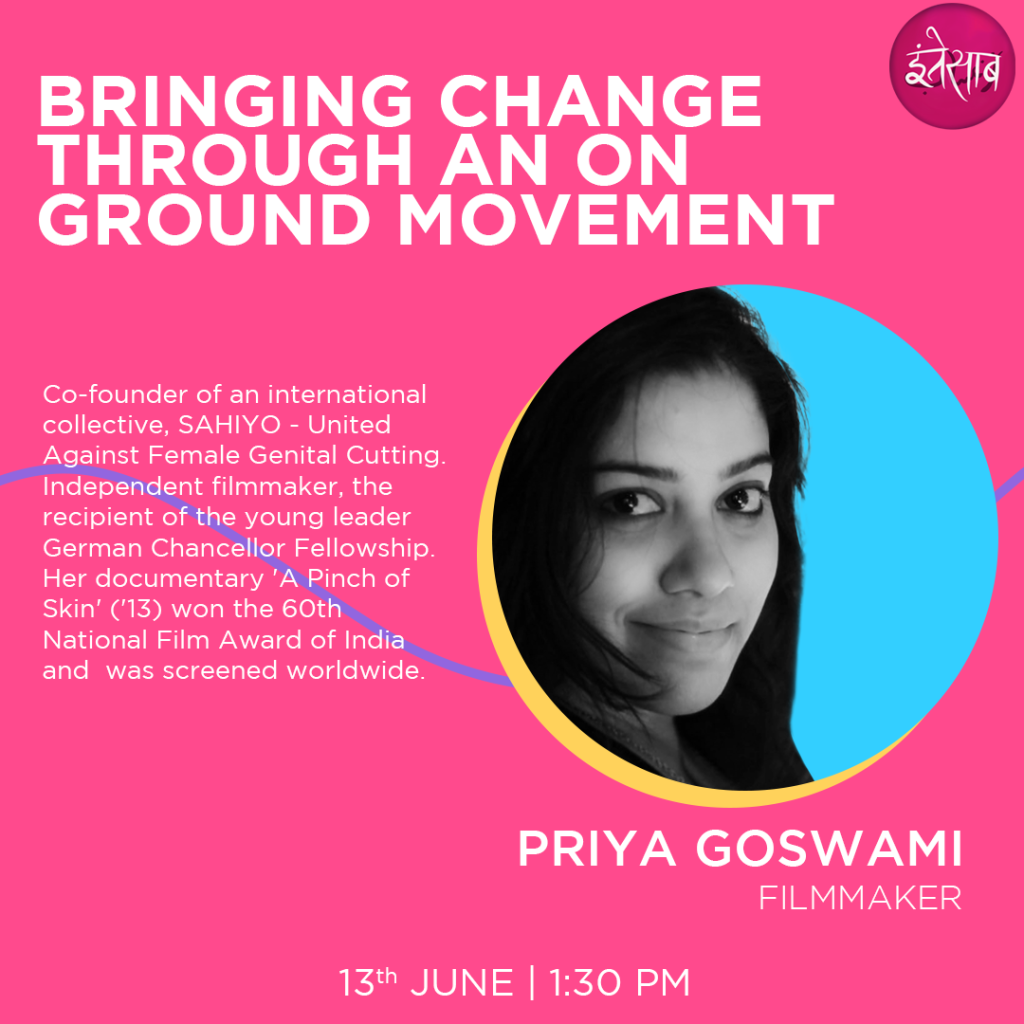
Sahiyo co-founder Priya Goswami gave a keynote speech at India’s first student-run online festival, Intesaab Fest 2020, supported by Ishaan Trust. Discussing change as an onground movement, she attributed Sahiyo’s growth to the sustained efforts of anti-FGC advocates and increasing community engagement. Her address titled, “Bringing Change through an on-ground movement,” also underscored the need for respectful communication and collaboration with the community. She spoke of fact checking not just the content, but also checking the visuals that accompany news reports, to avoid any sensationalist images and text. While also acknowledging the role and support of digital activists and media, she highlighted the importance of the stories keeping the interest of people who have undergone the practice at the forefront of all communication. The keynote address was met with resounding support for Sahiyo from the students who had joined the festival online.
